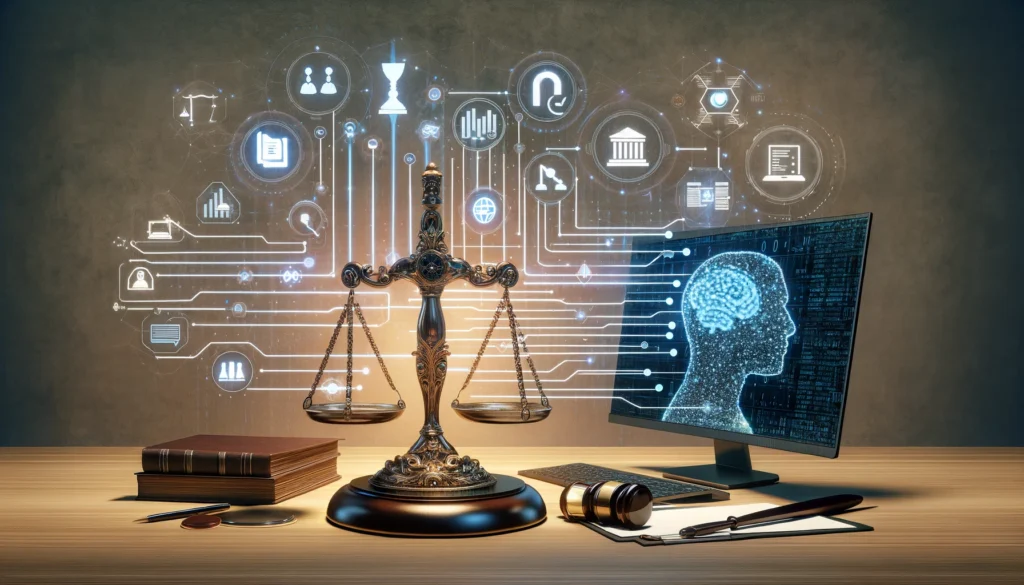
Harnessing the Power of AI in Corporate Law – Setting the Scene
The world of corporate transactional work is dynamic and complex, typically relying heavily on the expertise of paralegals. These professionals are integral in drafting documents, executing due diligence, and performing precise legal research. However, as the volume of work increases, so does the need for enhanced efficiency and accuracy.
Central to this modern revolution is the integration of Artificial Intelligence (AI) and advanced language models like ChatGPT. By leveraging AI, law firms can significantly boost their operational efficiency, streamline processes, and maintain high legal standards. Let’s delve deeper into how AI can be effectively harnessed in corporate law.
Streamlining Document Drafting – A New Era
Drafting legal documents has traditionally been a labor-intensive task requiring significant attention to detail. However, AI, particularly ChatGPT, offers innovative solutions to streamline this process.
Utilizing ChatGPT for Drafting
ChatGPT can assist in drafting a variety of corporate documents, from contracts to Non-Disclosure Agreements (NDAs). To generate these documents:
- Provide clear, detailed prompts: Overall structure and key clauses should be described comprehensively.
Example: “Draft an NDA between Company A and Company B covering confidentiality, exclusions, obligations, and duration.” - Iterate and refine: Generate initial drafts and refine them based on specific requirements and feedback.
- Ensure compliance: Have legal professionals review AI-generated drafts to ensure they meet legal standards and regulatory compliance.
The aim is to use AI to accelerate the drafting process while maintaining precision and compliance, significantly reducing the workload on paralegals.
Precision in Legal Research – Sifting Through Information
Accurate and efficient legal research forms the backbone of successful corporate law practice. ChatGPT can be a valuable tool in this arena.
Employing ChatGPT for Research
To maximize the benefits, consider the following approaches:
- Crafting precise prompts: Directly ask for relevant case laws or statutory references.
Example: “Provide landmark case laws on corporate fiduciary duty in the state of Delaware.” - Verification: Always verify the information provided by AI, cross-referencing with authoritative legal databases or original sources.
Example: Utilizing platforms like Westlaw or LexisNexis to corroborate AI findings ensures accuracy.
This workflow not only boosts research efficiency but also ensures that the information is current and reliable.
Enhancing Due Diligence – Thorough and Timely Reviews
Due diligence is a cornerstone of corporate transactions, involving meticulous review and verification of documents. ChatGPT can streamline these processes substantially.
Leveraging ChatGPT in Due Diligence
Key strategies include:
- Generating custom checklists: Tailor due diligence checklists based on specific transaction requirements.
Example: “Generate a due diligence checklist for a merger and acquisition involving a tech company.” - Summarizing large documents: Use AI to summarize extensive documents swiftly.
Example: “Summarize the main points of this 50-page shareholder agreement.”
These methods ensure that reviews are comprehensive and timely, without overwhelming paralegals with tedious details.
Automating Routine Tasks – Freeing Up Core Time
Routine tasks can consume a significant amount of time for paralegals, detracting from more strategic work. ChatGPT can automate many of these tasks.
Identifying Delegable Tasks
Tasks suitable for automation include:
- Client Correspondence: Drafting standard emails or letters.
Example: “Draft an email to schedule a follow-up meeting with Client X.” - Meeting Notes: Generating summaries of meeting discussions.
Example: “Summarize the key points from the last client meeting notes.” - Reminders: Setting up automated reminders for follow-ups and deadlines.
Implementing these will free up substantial time, allowing paralegals to focus on more critical, strategic tasks.
Protecting Confidentiality and Data Security – Best Practices
Maintaining data privacy and confidentiality is paramount when using AI in corporate law.
Best practices include:
- Data anonymization: Anonymize personal and sensitive information before feeding it into AI systems.
- Compliance: Ensure that AI usage complies with regulatory standards and firm policies.
Following these practices ensures that client information remains secure and confidential.
Real-Time Collaboration – Integrating AI into Team Workflows
Seamless integration of AI into team workflows can enhance collaboration and efficiency.
Embedding ChatGPT
Strategic approaches include:
- Embedding into collaborative tools: Integrate ChatGPT with tools like Slack or Microsoft Teams for real-time query responses.
- Data Sharing: Use AI for dynamic data sharing and updates within teams.
Example: “Provide an update on the current status of the due diligence process for Project Y.”
Such integration ensures that AI acts as a collaborative partner, streamlining communication and task management.
Continuous Improvement – Adapting and Evolving with AI
Staying abreast of AI advancements and fostering a culture of continuous learning is crucial for maximizing its benefits.
Encouraging paralegals to stay updated with the latest AI tools and features, and integrating periodic training sessions, can significantly enhance AI adoption. Fostering an AI-inclusive work culture ensures that the team remains adaptable and innovative.
Concluding Thoughts – The Future of Paralegal Work with AI
The integration of ChatGPT into paralegal workflows offers substantial benefits, from enhanced efficiency to improved accuracy in legal tasks. It is essential to continually refine AI usage strategies to adapt to evolving needs.
By maximizing the potential of AI, paralegals can focus on more strategic aspects of their work, ultimately paving the way for a future where human expertise and AI capabilities converge seamlessly. The evolving role of paralegals, augmented by AI, heralds an exciting new chapter in corporate law practice.


